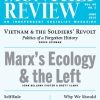Multinational Corporations and the Globalization of Monopoly Capital
In 1964, Paul Baran and Paul Sweezy wrote an essay entitled “Notes on the Theory of Imperialism” for a festschrift in honor of the sixty-fifth birthday of the great Polish Marxist economist Michał Kalecki.… [T]he essay offered the first major analysis of multinational corporations within Marxian theory. Parts of it were incorporated into Baran and Sweezy’s Monopoly Capital in 1966, two years after Baran’s death. Yet for all that book’s depth, “Notes on the Theory of Imperialism” provided a more complete view of their argument on the growth of multinationals. In October and November 1969, Harry Magdoff and Sweezy wrote their article “Notes on the Multinational Corporation,” picking up where Baran and Sweezy had left off. That same year, Magdoff published his landmark The Age of Imperialism, which systematically extended the analysis of the U.S. economy into the international domain.… In the analyses of Baran, Sweezy, and Magdoff, as distinct from the dominant liberal perspective, the multinational corporation was the product of the very same process of concentration and centralization of capital that had created monopoly capital itself. | more…
Reading Capital, Reading Historical Capitalisms
Marx’s Capital presents a rigorous scientific analysis of the capitalist mode of production and capitalist society, and how they differ from earlier forms. Volume 1 delves into the heart of the problem. It directly clarifies the meaning of the generalization of commodity exchanges between private property owners (and this characteristic is unique to the modern world of capitalism, even if commodity exchanges had existed earlier), specifically the emergence and dominance of value and abstract social labor.… Volume 2 demonstrates why and how capital accumulation functions, more specifically, why and how accumulation successfully integrates the exploitation of labor in its reproduction and overcomes the effects of the social contradiction that it represents.… Volume 3 of Capital is different. Here Marx moves from the analysis of capitalism in its fundamental aspects (its “ideal average”) to that of the historical reality of capitalism.… To move from the reading of Capital (and particularly of volumes 1 and 2) to that of historical capitalisms at successive moments of their deployment has its own requirements, even beyond reading all of Marx and Engels. | more…

June 2016 (Volume 68, Number 2)
On April 8, 2016, in what has already become a historic case on the climate, Magistrate Judge Thomas Coffin of the United States District Court of Oregon ruled against a motion to dismiss, in favor of the youthful plaintiffs in the Children’s Trust lawsuit (Kelley Cascade Rose Juliana, et al. v. United States of America, et al.) and against the defendants, consisting of the federal government and the fossil-fuel industry.… The defendants’ argument to dismiss was directed principally at what they contended were limits on the federal government’s public trust responsibility. It thus turned on whether the United States was obligated simply to follow capitalist precepts with respect to the natural-physical environment, or whether the government had a public trust to maintain the environment for the population and for future generations, going beyond the rules of the market. | more…
Marx’s Ecology and the Left
One of the lasting contributions of the Frankfurt School of social theorists, represented especially by Max Horkheimer and Theodor Adorno’s 1944 Dialectic of Enlightenment, was the development of a philosophical critique of the domination of nature.… Yet their critique of the Enlightenment exploitation of nature was eventually extended to a critique of Marx himself as an Enlightenment figure, especially in relation to his mature work in Capital.… So all-encompassing was the critique of the “dialectic of the Enlightenment” within the main line of the Frankfurt School, and within what came to be known as “Western Marxism”…, that it led to the estrangement of thinkers in this tradition not only from the later Marx, but also from natural science—and hence nature itself. Consequently, when the ecological movement emerged in the 1960s and ’70s, Western Marxism, with its abstract, philosophical notion of the domination of nature, was ill-equipped to analyze the changing and increasingly perilous forms of material interaction between humanity and nature. | more…
Radical Leisure
Connections, both real and hoped for, between the labor movement and environmentalists have been news for at least fifteen years now. The possibility of such a connection came into wider view at the Seattle World Trade Organization protests in 1999, when alliances between trade unionists and other protest groups made headlines…. Despite the once-exciting and novel possibility being now institutionalized in such organizations as the Labor Network for Sustainability, the Blue-Green Alliance, and SustainLabour, the thrill seems to be gone for mainstream environmentalist discourse, and labor has largely faded from view.… [The struggle to reduce work hours is fertile ground for uniting the efforts of workers and environmentalists.]… That fight for time, however, came to an end decades ago. Now those with jobs demand higher wages instead, and perhaps even overtime work, while the many unemployed and underemployed fight to work at all. Today the dominant idea of a working-class agenda is to fight to be allowed to sell one’s time. | more…
Beyond Opt Out
As the corporate takeover of public schools proceeds apace on a global scale, so too does the grassroots resistance. In the United States…. [o]ver 600,000 parents opted their children out of the tests in spring 2015; students have launched walkouts and boycotts; school boards are passing resolutions against overtesting; and teachers at a Seattle high school collectively refused to administer a test they deemed harmful to instruction. These actions and more demonstrate the hope and promise of public schools as sites for resilience and democratic resistance, even as corporate interests tighten their grip on schools under cover of “education reform.” This article reflects strategically on the fight for public education, with a special focus on the Opt Out movement, which was recently the subject of a special issue of Monthly Review. My treatment applauds opting out as a tactic in an organizing toolkit, but rejects it as a strategy, and takes issue with the analysis of corporate school reform proffered by the leading advocates of Opt Out. | more…

Vietnam and the Soldiers’ Revolt
[wcm_nonmember]
[/wcm_nonmember] It has been nearly fifty years since the height of the Vietnam War—or, as it is known in Vietnam, the American War—and yet its memory continues to loom large over U.S. politics, culture, and foreign policy. The battle to define the war’s lessons and legacies has been a proxy for larger clashes over domestic politics, national identity, and U.S. global power. One of its most debated areas has been the mass antiwar movement that achieved its greatest heights in the United States but also operated globally. Within this, and for the antiwar left especially, a major point of interest has been the history of soldier protest during the war.… Activists looked back to this history for good reason.… Soldiers, such potent symbols of U.S. patriotism, turned their guns around—metaphorically, but also, at times, literally—during a time of war. | more…
Self-Rule in the Balance
In They Rule, Paul Street offers a thorough deconstruction of the status quo of U.S. capitalism. The book’s subtitle gives a nod to the Occupy Wall Street movement, whose main victory was to popularize the concept of U.S. class conflict, as embodied in the “1 percent.” The title also recalls John Carpenter’s 1987 film They Live, a sci-fi spoof of the Reagan era that prefigured the Occupy revolt. Carpenter’s characters don “magic sunglasses” for intellectual defense against media misinformation.… One current form of that misinformation is the view that the Democratic Party exercises “left” politics. Street smashes this notion.… [However,] this is no academic query. | more…

May 2016 (Volume 68, Number 1)
A little less than two years ago, in July-August 2014, Monthly Review published a special summer issue under the title Surveillance Capitalism, edited by John Mage.… The lead article by Foster and McChesney was itself entitled “Surveillance Capitalism: Monopoly-Finance Capital, the Military-Industrial Complex, and the Digital Age.” In Foster and McChesney’s analysis, the problem of surplus absorption under monopoly capital was seen as having led to the development over the last seven decades of a massive surveillance network, extending across the sales effort, finance, and the military, and integral to the entire information economy.… We were therefore pleased to discover that the concept of “surveillance capitalism” has now entered the mainstream and is drawing considerable attention, through the work of Shoshana Zuboff, emeritus professor at the Harvard Business School.… ” She failed, however, to mention the prior treatment of “surveillance capitalism” in Monthly Review, despite the fact that her analysis was written in November 2014—judging by her accessing of numerous articles on the Internet on that date—four months after the MR issue was published and posted online.… | more…
Obamacare
As the Affordable Care Act (ACA, otherwise known as Obamacare) continues along a very bumpy road, it is worth asking where it came from and what comes next. Officially, Obamacare represents the latest in more than a century of efforts in the United States to achieve universal access to health care. In reality, Obamacare has strengthened the for-profit insurance industry by transferring public, tax-generated revenues to the private sector. It has done and will do little to improve the problem of uninsurance in the United States; in fact, it has already begun to worsen the problem of underinsurance. Obamacare is also financially unsustainable because it has no effective way to control costs. Meanwhile, despite benefits for some of the richest corporations and executives, and adverse or mixed effects for the non-rich, a remarkable manipulation of political symbolism has conveyed the notion that Obamacare is a creation of the left, warranting strenuous opposition from the right. | more…
Nature
“Nature,” wrote Raymond Williams in Keywords, “is perhaps the most complex word in the language.” It is derived from the Latin natura, as exemplified by Lucretius’s great didactic poem De rerum natura (On the Nature of Things) from the first century BCE. The word “nature” has three primary, interrelated meanings: (1) the intrinsic properties or essence of things or processes; (2) an inherent force that directs or determines the world; and (3) the material world or universe, the object of our sense perceptions—both in its entirety and variously understood as including or excluding God, spirit, mind, human beings, society, history, culture, etc. | more…
Orthodox Economics and the Science of Climate Change
We have finally reached the point where most people around the world believe that climate change is really happening. Almost a decade ago, the landmark report by Nicholas Stern sparked a fierce debate among economists, not over whether climate change was real, but over the costs of addressing it. In the years since, the Intergovernmental Panel on Climate Change (IPCC) has published further alarming reports on projected future global temperatures, rates of glacial melting, and sea levels. Most recently, last December saw an unprecedented agreement by nearly 200 countries at the Paris climate summit to take steps to address the problem.… My concern here is therefore not to continue making the case for the reality of climate change, but instead to show how that reality is portrayed—and distorted—in the mainstream media, with behind-the-scenes assistance from orthodox economic analysis. | more…
Voices, Not Numbers
U.S. educational policy and practice adhere to the old proverb that “children should be seen and not heard.”… Arguments for children—often made by children themselves—having voice and taking action on matters that affect their lives are rarely taken seriously.… Nevertheless, protecting children’s welfare need not exclude inviting them to speak on education issues. In some countries, such as Australia, New Zealand, Portugal, and the United Kingdom, children’s voices and opinions are considered vital…. In the United States, children’s voices are not sought out. They are most often the “objects of inquiry,”… [seen]…”as either a window onto universal psychological laws or as indicators of treatment effects. In both cases, the children themselves are simply instruments…vehicles for measuring outcomes.”… Black and brown children in particular are made into “objects of inquiry,” and are accordingly more watched, restricted, and disciplined.… Further, black and brown children, especially in poor and urban communities, have had their humanity devalued against that of children in whiter, wealthier schools. | more…